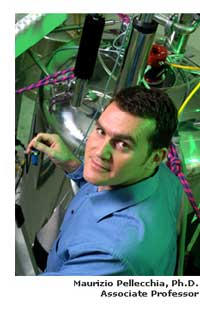
Tea Impacts BCl-2 gene: Fresh evidence claimed for how tea protects against cancer
Dec 2003. LA JOLLA, CA. Researchers at The Burnham Institute have identified ingredients in green and black teas that are potent inhibitors of a family of proteins implicated in many types of cancer, and discovered how these ingredients, called polyphenols, work to prevent the growth of cancer cells.
Cancer occurs less often among populations that drink tea, the world's second most commonly consumed liquid. This "population based" (epidemiological) evidence has been supported by "in vitro" laboratory studies, which indicate that green tea and certain black teas prevent cancer when applied to cells in a dish.
The critical question of "how" consumption of green or black tea might prevent cancer has eluded researchers until now.
A team led by Drs. Maurizio Pellecchia and distinguished cancer researcher John Reed has discovered that polyphenols act upon certain so-called "anti-death" proteins known as Bcl-2 and Bcl-xL, which are overproduced in most human cancers. These are dubbed anti-death proteins because they disrupt a critical pathway programmed into cells that acts as a culling mechanism to eradicate defective cells and to maintain a balance in cell numbers in the body.
Defective cells are supposed to do "apoptosis," i.e. commit cell suicide. Cancer starts to become a threat to the body when defective cells keep right on growing and dividing. So, failure of the cell death program is one of the hallmarks of cancer, and according to Reed explains much of the current difficulty in effectively eliminating cancer cells using available anti-cancer drugs or radiation therapy.
Bcl-2 and Bcl-xL, the subject of intensive investigation in ReedÂs laboratory, make desirable targets for drugs and other therapie: they interfere with tumor cell death induced by chemotherapy and radiation and are highly correlated with tumor resistance to chemotherapy.
Dr. Pellecchia, a medicinal chemist, uses sophisticated instrumentation called nuclear magnetic resonance (NMR) in combination with in silico molecular modeling as drug discovery tools. Looking for chemicals in a collection of molecules derived from Chinese herbal medicine, Dr. Pellecchia used NMR and computer animation to determine the 3-dimensional structure of certain tea polyphenols docked into the binding pocket of Bcl-xL.
 Drs. Pellecchia and Reed are using the information made
available through these studies to design semi-synthetic
versions of chemical compounds found in green tea extracts
to provide more potent inhibitors of Bcl-2 and Bcl-xL
than the naturally occurring chemicals found in tea.
Drs. Pellecchia and Reed are using the information made
available through these studies to design semi-synthetic
versions of chemical compounds found in green tea extracts
to provide more potent inhibitors of Bcl-2 and Bcl-xL
than the naturally occurring chemicals found in tea.
Dr. Reed, inventor of a DNA-based therapy for suppressing Bcl-2 in cancer stated, "this discovery is very exciting because the natural products found in tea are already more potent than other existing anti-Bcl-2 therapies in clinical trials. By using structure-based drug optimization technologies, we can take what Mother Nature has provided and make it better and safer."
How much green tea is required to suppress Bcl-2 and Bcl-xL activity in cells in a dish (in vitro)? "Surprisingly, very low amounts", according to Dr. Pellecchia. "The level required for inhibition of these proteins was very small--in the nanomolar range. Unlike previously proposed mechanisms for similar tea extracts against other protein targets, this tight inhibition correlates with the low concentrations of tea polyphenols present in the bloodstream after tea consumption. We expect that the anti-Bcl-2/xL activity of certain green and black tea extracts could be effective in vivo also after consumption of moderate amounts of tea. We believe this inhibition could play a major role in the cancer prevention properties of tea."
These results, published in the December issue of Cancer Research, the official journal of the American Association for Cancer Research, also point to novel clinical uses of tea extracts as chemo-sensitizers, which could overcome chemoresistance to conventional chemotherapy.
What's next? Dr. Pellecchia points out that "much work needs to be done experimentally in vitro, then in vivo starting with rodents before we move to human clinical trials, but we are very encouraged by these findings."
Maurizio Pellecchia, Ph.D. is an Associate Professor in the Burnham InstituteÂs Cancer Center.
John C. Reed, M.D., Ph.D. is President and CEO of The Burnham Institute, and Professor in the Institute's Cancer Center.
This research was supported by grants awarded from the National Cancer Institute, The Prostate Cancer Foundation (formerly known as CapCure), and the Hearst Foundation, Inc.
The Burnham Institute is an independent, nonprofit, public benefit organization dedicated to basic biomedical research principally in the areas of cancer, aging, and the neurosciences. The Institute ranks consistently among the world's most influential research organizations for the impact of its research in analyses conducted annually by the Institute for Scientific Information.
![]()


